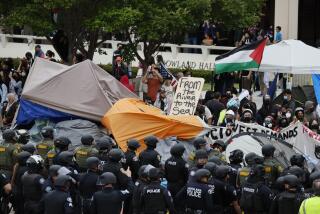The UC strike: A teaching moment
Tomorrow, I begin my 21st year teaching at UC Riverside. For once, I have no idea what exactly will happen when I face my new students.
I carefully prepared a syllabus for the course -- upper-division fiction -- which is filled with anxious seniors who’ve been e-mailing me that they need this class to graduate. I’m excited to talk about a former student whose published book we will use. But before we get to all of that, we will have a decision to make.
On all nine UC campuses Thursday, a massive one-day walkout has been organized. The strike has been called by the university workers union and the faculty to protest the way the administration has handled the 3% budget cut facing the UC system. The goal is to protect UC workers making less than $40,000 a year, to force UC President Mark Yudof to make the university’s budget public and to reassert the faculty’s role in UC governance.
I will leave the decision up to my students: Do we walk out or stay in class? We could end up marching around the bell tower; we could start the work they’ll have to master this quarter; or maybe we could do both. It’s for them to decide, because after all these years, I value my students -- for the way they cheerfully teach me new words, for the stories they learn to tell, for the new worlds they show me -- above all else.
I am an accidental professor. Without a doubt I am the only UC Riverside prof who once climbed halfway up the venerable bell tower from the outside (I was 10 and grew up nearby). I never thought I would go to college. But I did, becoming a writer and a teacher. Students often write about how teachers change their lives, but this fall I think about all the ways my students have affected me.
Often, I tell my three daughters to put lunch “in the dashboard microwave.” That’s because John Olivares Espinoza, a UC Riverside student who grew up in Indio, wrote great poems about working for hours in intense heat as the son of a landscaper while his home-packed lunch was warmed by that makeshift oven. When I see an old truck, I remember Darren DeLeon, who wrote a poem about his grandfather’s Chevrolet Apache, with the gearshift as his abuelo’s scepter and the dashboard his altar.
This summer, I watched the wedding of one of my students (who also became a writer and teacher), which was officiated by his best friend (who also became a writer and teacher). They met 15 years ago in my class. Michael Jaime-Becerra and Patrick Michael Finn published books and made me so proud (the ceremony was funny -- and well written).
They teach -- Jaime-Becerra and Finn and Espinoza and so many more -- at universities (Cal State Fresno, UC Riverside and more), at community colleges (Glendale, Crafton Hills, San Bernardino Valley and more) and at high schools (Garfield, El Monte, J.W. North and more). They’ve published novels and short stories and essays and poems, but when I see them, we always end up talking about teaching.
Over the years, some people have said to me that it’s frivolous to teach writing -- compared with a practical skill like auto mechanics or biology or engineering. But I say that each of my students who learned to tell a story, who taught someone else how to tell a story, who read a story and thought about it and kept it inside until its meaning was clear, learned something vital. The world runs on stories. It is how we humans survive.
What I tried to give them, and what I hope to give my students this fall, is the power that comes with the freedom to write about themselves, to tell their own stories and the stories of their communities, populated by people they know, real or imagined.
My students are like me: Often the first in their families to attend college. I say to them, you have stories no one else has, and you write about places no one else does, and you give voice to people no one else knows. Don’t let anyone tell you that a Huntington Beach surfer’s story doesn’t deserve to be told (that student went on to teach English in Japan). Don’t ever let anyone tell you a migrant farmworker picking grapes in Coachella doesn’t deserve poetry (that student teaches at the New School in New York City).
What to do tomorrow, then?
I agree passionately with the demands behind the strike. My sister-in-law is a custodian at UC Riverside, a single mother of three. Close friends work as clerical staff or in food service. Anyone who makes less than $40,000 a year should be insulated from the cuts. The faculty, the students and all of us who “own” UC should know precisely how it is spending its money. The faculty should not be powerless, and the latest tuition increases -- 50% by the time this academic year is over -- only make it all worse.
And yet, what is the right thing to do? While I wait for my youngest daughter in the high school parking lot, I look at the altar of my own dashboard and think about the hard work of students, the sacrifices of their families, the cumulative effect of their desire to push ahead. What would the parents of my students want, given their own worries? What will these seniors think tomorrow, nervous about a class some have been waiting two years to take? On Thursday, I’m going to meet my students and ask them to vote. I will not tell them whose side I’m on, except that I’m on their side. I will not vote. If they decide to march around the bell tower, that’s how class will unfold. If they want to write a letter to President Yudof, we will. If they want to ignore the strike, we will begin with poems about Apaches and dashboards and surfers under the Huntington Pier.
I can’t think of a better way to do the work of teaching. I can’t think of another way to do my work of conferring power. And I can’t help but wonder what story we will end up telling tomorrow.
More to Read
Sign up for Essential California
The most important California stories and recommendations in your inbox every morning.
You may occasionally receive promotional content from the Los Angeles Times.











